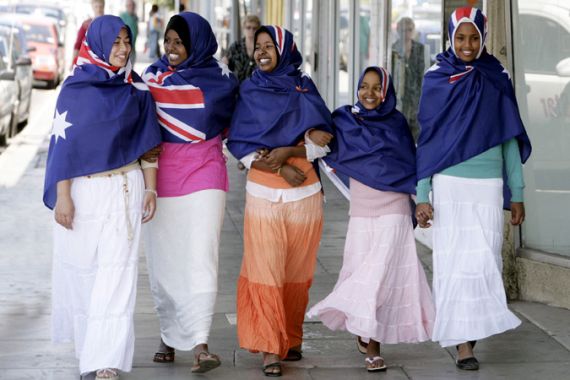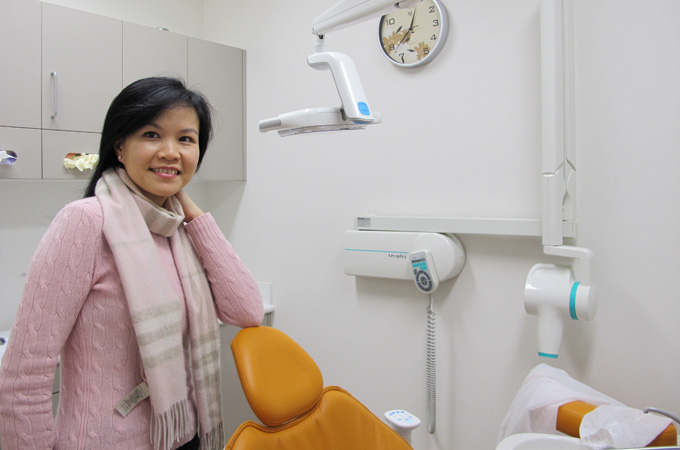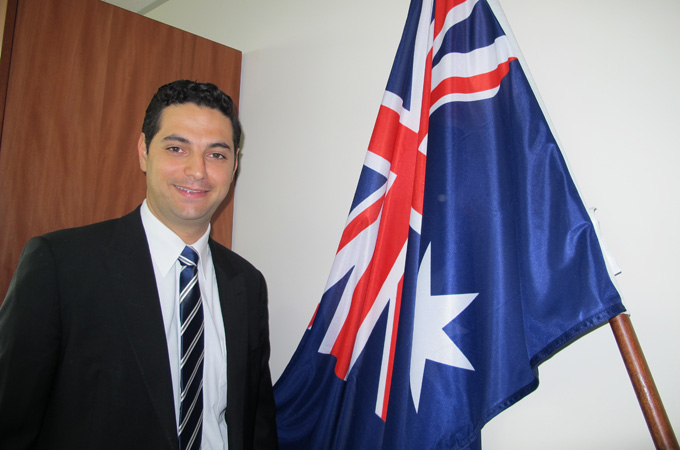Behind Sydney’s multicultural veil
Asylum-seekers are at the front of many minds ahead of Saturday’s election.

Sydney, Australia – Reports of the Australian navy intercepting boatloads of asylum-seekers trigger vivid flashbacks for Dr Tania Nguyen, a dentist in Sydney’s west who arrived by sea as a Vietnamese refugee in the 1980s.
Her spotless, brightly lit surgery in suburban Greenfield Park is a world away from the cramped fish-holds where she spent five harrowing days and nights as a 13-year-old.
 |
| Tania Nguyen, a dentist in Sydney, arrived by boat as a refugee from Vietnam [Sarah Colyer/Al Jazeera] |
She journeyed towards her new home aboard a 15-metre motorised fishing boat, huddled below deck with some 70 fellow passengers.
“Everyone sat like this,” she said, bringing her knees to her chest. “If you wanted to go to the toilet you just had to do it there.”
Nguyen and her family managed to reach safe harbour in Thailand, suffering only moderate dehydration. They lived there for two years in a refugee camp, each confined routinely to 70 square centimetres of allocated floor space, until Australian authorities accepted them as refugees.
Now, almost three decades on, patients reclining in Nguyen’s dental chair regularly air their thoughts on “boat people” – a burning issue in the lead-up to the federal election on Saturday, amid an increase in official arrivals from 60 in 2006 to more than 17,000 in 2012.
‘Racist undertone’
Prime Minister Kevin Rudd’s ruling Labor Party announced in July that asylum-seekers coming by boat would be sent to the Pacific island countries of Papua New Guinea or Nauru instead of Australia, to be detained until their visa applications could be processed.
Almost 1,000 people seeking asylum in Australia have drowned at sea since 2007, when Rudd began his first of two stints as prime minister, according to the Monash Australian Border Deaths Database.
Labor has said this is why it has adopted such a tough stance.
Pollster John Scales, of JWS Research, has said that much of the anger directed against Labor has its roots in a kind of racist-tinged envy, with migrant voters worried that new boat arrivals from other countries will lessen their own chances of bringing more family members to Australia.
The issue of asylum-seekers brings together social, economic and cultural concerns.
“It’s a different sort of racism to standard Australian Anglo-Saxon racism,” Scales told Reuters. “But it’s still racism.”
However, Tim Soutphommasane, Australia’s Race Discrimination Commissioner, disagrees.
“It’s not a case of deep rooted racism in Australian society,” he said.
“The issue of asylum-seekers brings together social, economic and cultural concerns.”
Nguyen also rejects the notion that Australia is an inherently racist country.
“It’s not good to be an illegal immigrant. You can get an application, and if you are a genuine refugee you should be accepted by the Australian government and given a chance to thrive.
“You don’t want to bring people in and then ruin your country.”
Job discrimination
 |
| Mannoun, mayor of Sydney suburb Liverpool, was born in the US to Lebanese-African parents [Sarah Colyer/Al Jazeera] |
Despite the tough talk, Australian politicians have not abandoned the language of multiculturalism like some of their counterparts have in Europe, where German chancellor Angela Merkel declared the death of “multikulti” in October 2010.
Soutphommasane said the Australian and European experiences had been starkly different.
“The children of overseas-born Australians outperform the children of native-born when it comes to educational outcomes and work outcomes,” he said.
“That is a ringing endorsement of how multicultural Australia has fared.”
Discrimination still exists, he concedes, particularly in regards to job opportunities.
A 2009 study found people with Middle Eastern- or Chinese-sounding surnames were less likely to be called back from an Australian employer after submitting their resume, compared with people with Anglo Saxon- or Italian-sounding names.
“In general, Australia has conducted a grand experiment as an immigrant nation and succeeded,” Soutphommasane told Al Jazeera.
Nowhere in Australia has multiculturalism been tested more rigorously than in Sydney’s west. The suburb of Lakemba is home to one of the largest mosques in Australia, and more than half the population is Muslim.
Further west along the Hume Highway is Cabramatta, where every second resident is Chinese or Vietnamese, Australian Census figures show.
In one short stretch of Liverpool is there is a Taoist temple, an Assyrian function centre, a Baptist church and a Hungarian social club.
Liverpool is also developing an Indian shopping strip, and hosted its first Bollywood festival in August.
Drive-by shootings
This array of cultures is part of western Sydney’s charm, according to Liverpool’s Muslim mayor, Ned Mannoun, who was born in the US to Lebanese-African parents before moving to Australia, aged 11.
It was Sydney’s multiculturalism that lured his businessman father to the city in 1993.
“In Australia, we encourage people to hold on to their heritage more than they do in America,” said Mannoun, who regards the best part of his job to be officiating at citizenship ceremonies.
“If we’d sat here five years ago and said there would be a 30-year-old Muslim mayor in Liverpool, people would have laughed,” Mannoun said. “But I don’t believe in making excuses.”
While the race riots on Cronulla beach eight years ago have not been repeated, ethnic tensions in Sydney remain.
The New South Wales Police Force has a Middle Eastern Organised Crime Squad and an Asian Crime Squad, while crime statistics reveal a concentration of drive-by shootings in Sydney’s west.
A number of people from ethnically diverse backgrounds have gravitated towards outlaw motorcycle groups in the last five years - groups that used to be almost neo-Nazi.
A new gang, the Brothers for Life, comprising mostly young, Middle Eastern men, has come to the attention of the Australian media in recent months.
The gang has targeted Sydney’s Sunni Muslim community with a spate of extortion cases, knee-cappings, shootings and murders, according to reports.
Kaldas doubts the trouble in Cronulla has bolstered numbers in ethnically based gangs. He believes the violence alarmed most Australians and led to concerted efforts, especially by Lebanese-Muslim organisations, to improve community relations.
But Kaldas said: “A number of people from ethnically diverse backgrounds have gravitated towards outlaw motorcycle groups in the last five years – groups that used to be almost neo-Nazi.”
The deputy commissioner said he did not have much sympathy for the notion that these people were only carrying out crimes because they were disenfranchised, or from a low socio-economic background.
Tensions overseas, particularly in the Middle East, have occasionally ignited violent flare-ups on Sydney’s streets, he notes.
Understanding of Islam
Ahmad Malas, the Australian-born spokesman for the Lebanese Muslim Association of Australia, believes most people want to preserve the peacefulness they have in Australia.
“Many community members are really saddened when they see people bringing conflicts from the Middle East into Australia, to the extent that it becomes violent,” he said.
While he still endures the occasional taunt of: “Go back to your own country,” Malas feels that Australia is becoming more understanding of Islam, and that the relationship between police and the Lebanese Muslim community in Sydney is improving.
“The best thing about being Australian is that I can still practice my religion, and live in a society that’s stable and peaceful,” he said.
In 2013-14, Australia expects to welcome 190,000 new migrants and a further 20,000 refugees, official figures show.
Ensuring these newcomers can participate constructively in Australian life will take work and perseverance, Soutphommasane, Australia’s Race Discrimination Commissioner said:
“It’s dangerous to think that the task of cultivating openness and acceptance is ever over.”
Follow Sarah Colyer on Twitter: @colyers